
Return to home page
Other blogs/sites I follow: Christine Allen's // Gordon Price's // Ray Ison's // Sarah Jane's photo site // Travel Painting Blog // Roland Hemmert art site
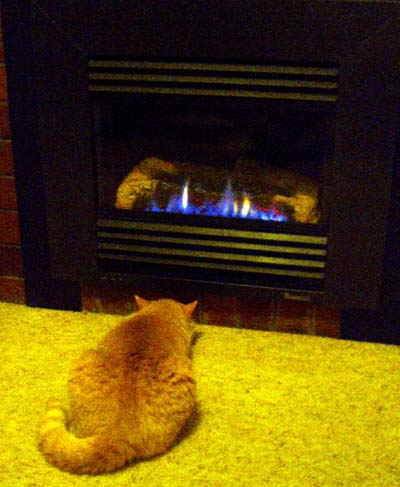 July 30, 2008: July 30, 2008: -George has been noticing the cold lately, along with everybody else. Wimpy Sydney has been especially hard hit with highs barely into the double digits, and parts of the north shore had what looked suspiciously like snow a few days ago -- it was only "soft hail," said the BOM (Bureau of Meteorology). -Breaking news: 61 of 84 Starbucks in Australia are closing this Saturday. I recall seeing the first one in Sydney, near Central Station, on a trip here in 2001. In spite of their marketing savvy, they haven't been able to challenge the Australian native coffee shops, with their clattery chairs, long blacks, flat whites and particular kinds of cakes and slices. Nearly 700 people will be losing their jobs. -In the last entry I reported how the opposition was mounting a bizarre, do-nothing policy as an alternative to the government's climate-change proposals. Yesterday, however, leader Brendan Nelson of the Liberal Coalition was "rolled" by his colleagues, so the major parties in the parliament are all singing from the same songsheet again, with the proviso that the opposition will want to go slower in implementing the Emissions Trading Scheme. Interesting that part of the pressure on the Coalition came from big business, which didn't want the government to have to negotiate with the more radical Greens in order to get the scheme through the Senate. |
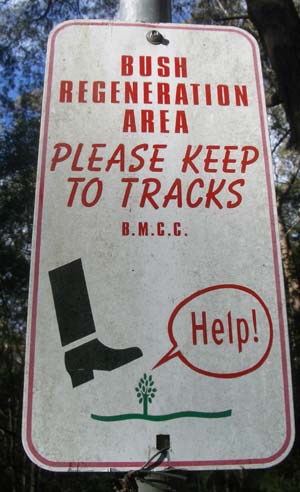 July 28, 2008: July 28, 2008: -the government's attempts to sell its climate change policy, the centrepiece of which is the Emissions Trading Scheme, is going through stormy weather. So much of its eventual success will depend on the nation's ability to reduce the 70% of all emissions produced by the energy industry itself. Australia runs on coal. No surprise there isn't a lot of hydro in this, the driest continent on the planet and although there's a lot of effort to install wind and solar it's got a long way to go. The Coalition -- the Liberal and National party cabal that were government for the dozen years until last November -- is playing the most astonishing wedge politics vis-à-vis climate change. Former PM John Howard was a real skeptic but eventually came around and offered an emissions policy which the new Labour government has largely adopted while changing the start time to 2010, not 2012. Now in opposition and sensing blood as fuel and energy prices rise, the Coalition has actually reversed direction, saying they don't think there should be any leadership by Australia on the issue and that we should just sit back and wait for the big nations of the world to sign on. This during a week when a poll indicated that 3/4 of Australians wanted a policy to address climate change and were okay with paying higher prices to see it implemented. One place where the government seems to be on the wrong track, har har, is railway policy. The trucking industry and individual drivers will get tax breaks on the carbon pricing, but the railway industry and rail transport, which are much more energy-efficient, are getting nothing from the proposed scheme. So much for getting goods out of trucks and off the highways and encouraging people to use public transit. Australia's rail system is a mess, mainly occupied with carrying bulk commodities like coal. Having recently seen mile-long Canadian container trains winding their way through the Fraser canyon, I realize how far behind Australia is. Road users here amount to 89% of the carbon emitted by the transport sector; rail just 6%. And another screw-up. It used to be that if you made less than $100,000 you qualified for generous government help to install solar panels on your house and feed excess power back into the grid. The new government changed the limit to $60,000 and solar installations have come to a screeching halt. 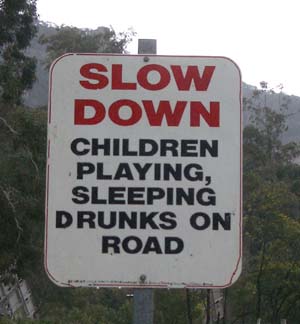 -I'm sure the
pictures of the Qantas jet with the hole blown in its
side due to an exploded oxygen bottle made it onto newscasts all over
the world. I had a sense of déja vu seeing pictures of the
plane, a 747
named Longreach after the legendary town in central Queensland where
Qantas -- Queensland & Northern Territory Air Service -- got
its start. That was the plane I caught in Los Angeles in 1998 to come
down here to join Christine and go on to Tasmania. I have this memory
of being in the departure lounge as the nose of the huge plane slowly
approached the gate, and reading "Longreach" on its side. How
appropriate, I thought, not knowing it was the name of a town. You have
to have a long reach to fly non-stop across the Pacific. -I'm sure the
pictures of the Qantas jet with the hole blown in its
side due to an exploded oxygen bottle made it onto newscasts all over
the world. I had a sense of déja vu seeing pictures of the
plane, a 747
named Longreach after the legendary town in central Queensland where
Qantas -- Queensland & Northern Territory Air Service -- got
its start. That was the plane I caught in Los Angeles in 1998 to come
down here to join Christine and go on to Tasmania. I have this memory
of being in the departure lounge as the nose of the huge plane slowly
approached the gate, and reading "Longreach" on its side. How
appropriate, I thought, not knowing it was the name of a town. You have
to have a long reach to fly non-stop across the Pacific.-yes, we seem to be coming across some interesting signs as we roam around. The one above was at Mount Wilson, the village on the other side of the Grose Valley; this one was at the abandoned mining town of Newnes in the Wolgan Valley, where we went the other day for an afternoon walk. -The table below appeared in the weekend paper. Most of the figures in it make some sense in the high-inflation atmosphere here, where you can get more than 8% on a bank term deposit and mortages are about 9.5%. The drop in fruit prices can be traced to the end of the drought in some of the growing areas, while dairy and wheat have gone up due to persistent drought and the high cost of feed coming from the "breadbasket" to the west of us here. Wine is quite stable -- we're still draining the lake from previous record harvests. 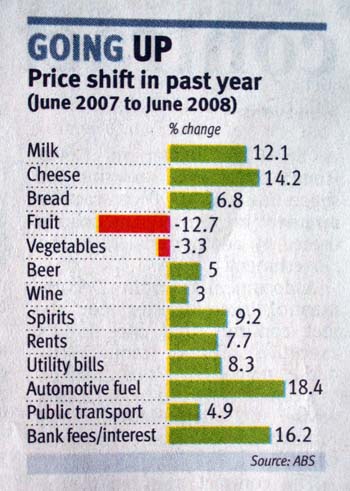 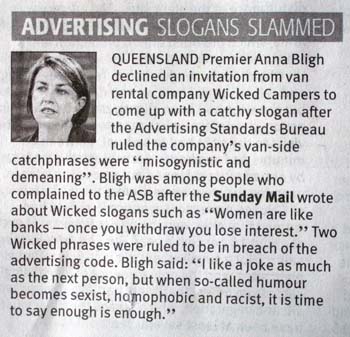 -finally, it was
great to hear this news last week. Wicked Campers rents a fleet of
small, camperized vans, mostly Mitsubishis, covered in graffiti-style
paint jobs that appeal to the "Xtreme" travelling backpacker crowd.
They are a regular sight here in the mountains, which is so much a part
of the grand tour. The slogan repeated in this article is one of the
more clever ones; many are not sexual, they're just gross (yes I know
I'm getting old). You have to
wonder, given the number of Asians who rent them for their holidays,
how many of the drivers know what their vehicle is saying to the people
whose towns they're passing through. -finally, it was
great to hear this news last week. Wicked Campers rents a fleet of
small, camperized vans, mostly Mitsubishis, covered in graffiti-style
paint jobs that appeal to the "Xtreme" travelling backpacker crowd.
They are a regular sight here in the mountains, which is so much a part
of the grand tour. The slogan repeated in this article is one of the
more clever ones; many are not sexual, they're just gross (yes I know
I'm getting old). You have to
wonder, given the number of Asians who rent them for their holidays,
how many of the drivers know what their vehicle is saying to the people
whose towns they're passing through. |
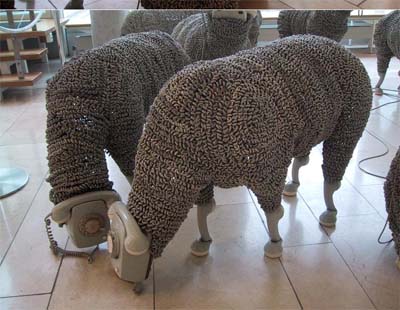 July 25, 2008: July 25, 2008: -everybody knows the way that images streak around the world on email, usually arriving in the inbox as a Fw: Fw: Fw: and originating with someone who is "6 degrees of separation" from you. Such is the case with these wonderful sheep made of phones and cords, installed in a foyer somewhere in the real world. They remind me of the works of Canadian artist Brian Jungen, such as his whale skeletons made from plastic lawn chairs. I typed "phone cords"+ sheep into Google and got a pageful of blogs all copying the photos, but not one of them mentioned the name of the artist or the location of the installation! Arghhhh! Christine found them by searching "telephone sheep" -- they're the work of an artist named Jean-Luc Cornec, installed in the Frankfurt Museum of Communications. It was a similar situation a few weeks ago when some Fred Herzog pictures of old Vancouver arrived in my inbox. It was wonderful to see them, but Fred's name had been left off. Someone had just scanned the images from his book, I guess. What is it about this part of the web where everything is just a commodity -- a brief entertainment -- and no one gets credit for anything? Ditto with the John Clarke/Brian Dawe satires I referred to below; by the time they get out on the email circuit their authorship has been deleted. |
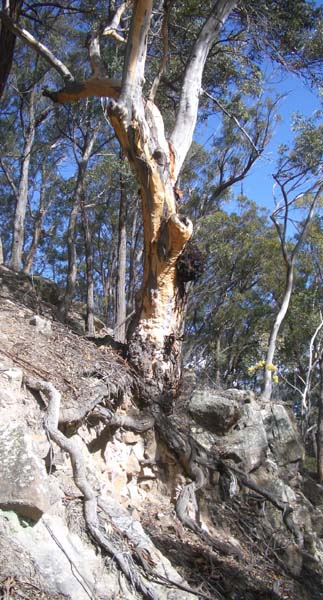 July 22, 2008: -last
Friday was another wonderful hike, this time in the Wollemi National
Park about 50 km north of here along an old coach road and abandoned
railway line, including some fabulous views and 500 metres in a old
railway tunnel dotted with glowworms. But I've been posting a lot of
scenic photographs lately and thought the ones I took looked a lot like
all the previous ones, so I've just posted this tree picture, which
reminded me of a man's first stretch of the morning. July 22, 2008: -last
Friday was another wonderful hike, this time in the Wollemi National
Park about 50 km north of here along an old coach road and abandoned
railway line, including some fabulous views and 500 metres in a old
railway tunnel dotted with glowworms. But I've been posting a lot of
scenic photographs lately and thought the ones I took looked a lot like
all the previous ones, so I've just posted this tree picture, which
reminded me of a man's first stretch of the morning. -you've got to hand it to the Catholics. They pulled off the misnamed World Youth Day, which was more like a week, in sunshine and above-average temperatures, channelling the weather-god. The final mass with the pope, Sunday at the huge Randwick racetrack in Sydney, looked like a rock concert on the TV, especially from the "holycopter." Somewhere around 225,000 young people camped out overnight on Saturday waiting for the mass without apparently any carrying-on -- where do they get their self-control? Talk about all gong and no dinner ... if it were indeed a rock concert you can imagine the bacchanal. The pilgrims, as they're dubbed, seemed totally entranced by the street theatre, like the Stations of the Cross, and ritual that the Catholic church has always been a master of. And to think they did it with only a $90 million subsidy by the taxpayers of secular Australia! Amazingly the Sydney transit system held up, carrying more than a half million people efficiently each day. One official said on the radio that it showed what was possible when the train, bus and ferry systems actually coordinate their operations. Normally they don't -- they're bureaucracies unto themselves fiercely guarding their turf -- so when you use transit in Sydney you're always buying different tickets and juggling schedules for different modes of transport. And yesterday was the busiest day on record for Sydney airport as tens of thousands headed for home, busier even than the Olympics in 2000. We went for a walk up to town yesterday afternoon and saw hundreds of the young pilgrims streaming down the street from the railway station to the youth hostel, so some of them are spreading out across the country to carry their message to the heathens. Glad the local Muslims aren't trying to compete. The young Catholics do tend to proselytize but not to the extent of the Happy Clappers, the usual term for evangelical church members. The black spot on the event was the unresolved issue of sexual abuse by priests. The pope apologized publicly, and a hand-picked few abuse-victims were invited to a private mass with him, but the most vocal of the abused and their families were shut out, including parents of two girls whose repeated raping by a priest led to one's suicide and the other's chronic drug addiction. And a notorious priest who had been caught several times photographing naked children, and then transferred interstate, was finally ordered away from the WYD events by the church. Perhaps he should have said he was an artist, like the photographers mentioned earlier in the month, and then his motives would have been above criticism? -more details are emerging about the "cap and trade" Emissions Trading Scheme which is slated to start in 2010. Energy-intensive industries like aluminum smelting, which depends on coal-generated electricity, will receive 90 percent of their carbon permits for free in order to keep them internationally competitive. Other industries will get a lower percentage. Agriculture will become part of the scheme in 2015. The money generated by the permits that industries have to buy will compensate affected individuals and support greener technologies. It's all fiendishly complicated -- see the note below about the John Clarke satires, as the most recent one focused on the prime minister's inability to explain the system clearly. The political question is whether Australia is getting itself too far ahead of the rest of the world, especially India and China which haven't signed on to any reductions. The government is arguing it has to demonstrate leadership and is also responding to research that indicates Australia will be hit soonest and hardest by climate change: drought, extreme heat, storms, rising water levels and the destruction of the coral in the Great Barrier Reef. I find it most fascinating reading which industries release the most carbon, once you get below the energy industry itself. Beef cattle production tops the list at 11.2%. Then come aluminum, cement and lime, followed by sheep at 3.4 and dairy cows at 2.7. Agriculture totals 17% of the total national emissions, but there's some question about the modelling due to the amount of carbon that animals actually consume. -finally, I've been interested to see the political satires of John Clarke and Brian Dawe making the internet/email rounds. Every Thursday just before 8 in the evening Clarke and Dawe do a topical skit at the end of an ABC current affairs program: Dawe is the interviewer and Clarke, one of the funniest people on the planet, is addressed as "Mr. Prime Minister" or "environment minister" or whatever. They are so believable, so drolly bureaucratic and prevaricating and spinning, that people in other countries are believing the skits to be true. The one that's gone around the most is "The Front Fell Off," in which Clarke as environment minister tries to explain a situation where the bow fell of a tanker in the Indian ocean. The whole set is on-line as streamed video -- well worth watching -- at www.abc.net.au/7.30/clarkedawe.htm |
| July 15, 2008: the World Youth Day mega-pilgrimage of 150,000+ Catholics is well underway in Sydney. I misspoke in the previous entry when I suggested that the federal court couldn't overturn the NSW State law making a crime out of "annoying" and "inconveniencing" the visiting pilgrims. The federal court has just overturned the law, deeming it "too general in its application." The case was brought by two university students heading the "No to Pope" coalition. "It is now legal to annoy people," said one of the lawyers who argued the case, "and the world is a better place for it." It's astonishing the disruption in central Sydney, with roads closed and unbelievable congestion, which we of course are unaffected by as we are 100 km. away. But there are benefits from WYD: the ramshackle old Catholic seminary on Katoomba's main street was painted up beautifully a couple of months ago. Doubtless, mobs of the pilgrims will make their way up to the Blue Mountains as soon as "Super Thursday," as the papal walkabout has been dubbed, is over, and will want to see the local sites well cared for. |
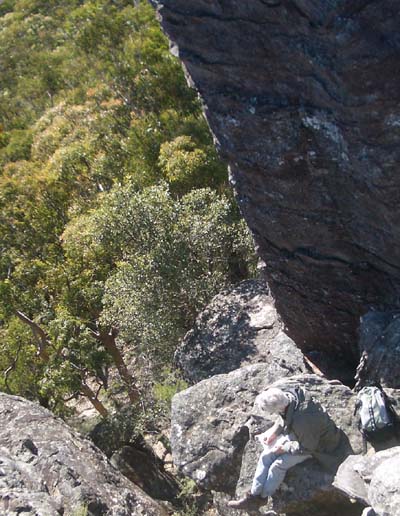 July 13,
2008: that's me seen from above, getting in a
little drawing yesterday after lunch on one of the most strenuous hikes
I've done in the mountains. It was Saturday, about midday, and
brother-in-law Doug and I had hiked out to the Ruined Castle, an
enormous pile of eroded boulders and rocky outcroppings in the Jamison
Valley about 10 km. from home as the kurrawong flies. Doug had climbed
up onto one of the rock
stacks -- a bit too much for my vertigo -- and left me
sitting on a comfortable rock in the sun. Temperature of 11 degrees or
so and no wind, a nice break from the days of high winds and colder
temperatures that had preceded it. July 13,
2008: that's me seen from above, getting in a
little drawing yesterday after lunch on one of the most strenuous hikes
I've done in the mountains. It was Saturday, about midday, and
brother-in-law Doug and I had hiked out to the Ruined Castle, an
enormous pile of eroded boulders and rocky outcroppings in the Jamison
Valley about 10 km. from home as the kurrawong flies. Doug had climbed
up onto one of the rock
stacks -- a bit too much for my vertigo -- and left me
sitting on a comfortable rock in the sun. Temperature of 11 degrees or
so and no wind, a nice break from the days of high winds and colder
temperatures that had preceded it. We had left about 9, scraping hard frost off the car's windscreen and, with Christine dropping us off, started walking from a spot on the Narrow Neck escarpment, where a steep trail called the Golden Stairs descends the rock face into the valley. 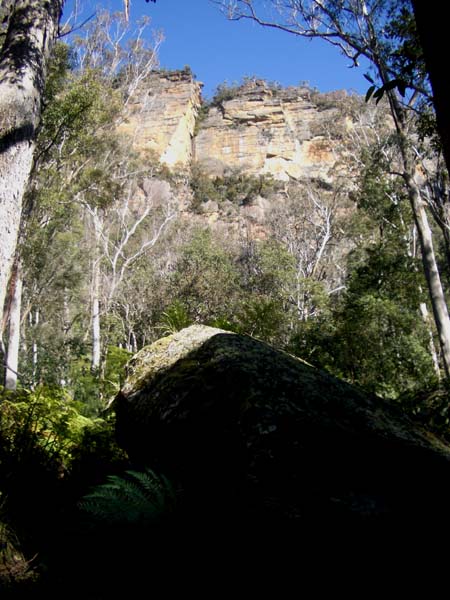 The trail ran for
about 5 km. through shaded bushland with occasional views up to the
Narrow Neck escarpment and down onto the valley. The forest floor is
littered with sandstone boulders that have fallen from above, many the
size of cars, even houses. Near this spot, the
forest was full of bellbirds, whose "tink-tink" calls were like ...
yes, bells. They're the most quiet, unassuming little brown birds,
almost invisible in the dappled light of the eucalypts, yet their calls
somehow carry for miles. For example, when you're up at the top of the
escarpment at any of the famous lookouts, like the Three Sisters, you
can hear the bells faintly in the valley below.
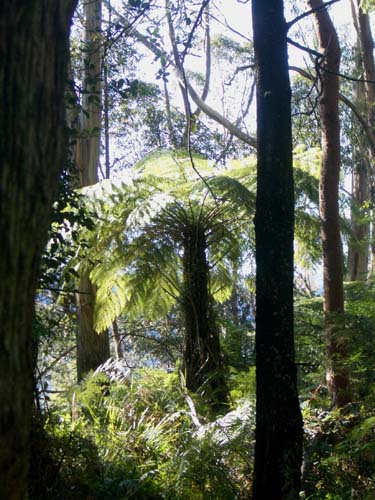 In some places
the bush was quite open, but in areas protected by the
escarpment from the drying northerly winds it is a rainforest dotted
with tree ferns and strung with immense climbing vines. The look is
almost prehistoric -- it would not be surprising to see a dinosaur
moving among them. Well, actually, it would be quite surprising, but
you get the idea. In some places
the bush was quite open, but in areas protected by the
escarpment from the drying northerly winds it is a rainforest dotted
with tree ferns and strung with immense climbing vines. The look is
almost prehistoric -- it would not be surprising to see a dinosaur
moving among them. Well, actually, it would be quite surprising, but
you get the idea.The trail then climbs onto a ridge and ends at the Ruined Castle. Suddenly you have to scramble hand over hand, and the steep passage to the upper level reduces to a narrow gap between two boulders that is more like an opened trap door. There's just room for a body; packs have to be passed up separately. The photo below, taken by Doug from the top of the stack, shows the view back toward Narrow Neck. Millions of years ago the land was all at its level, but the sandstone eroded away, leaving the basalt-capped areas like Narrow Neck and the Ruined Castle standing above the eucalypt-cloaked valley. 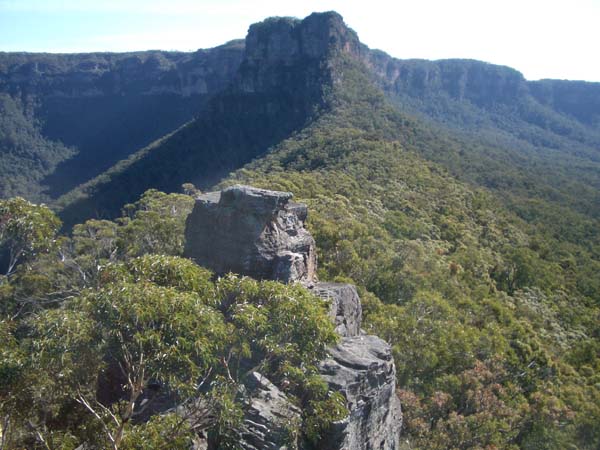 After about an hour,
other hikers
began to arrive -- it's a popular destination and, also, it's the
winter school holidays so there are a lot of families coming to the
Blue Mountains. We began the slog back with the intention of continuing
all the way to the base of the funicular "Scenic Railway" below
Katoomba.
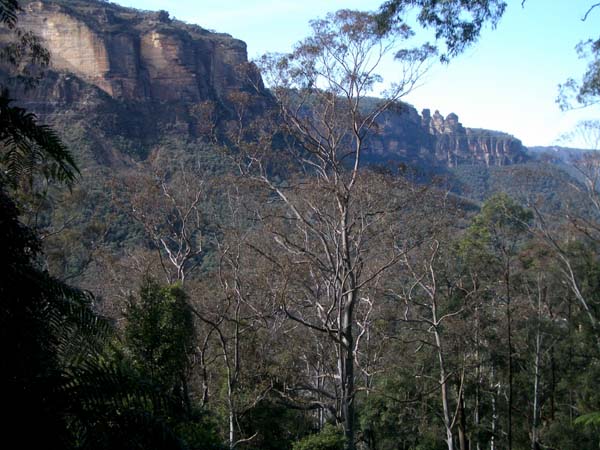 At this point we're still hugging the edge of Narrow Neck; the trail winds around the end of the valley, past the sheer rock face (on the left) created by a 1930 landslide, then around the near promontory to the base of the funicular railway. Katoomba's famous Three Sisters, in the distance, are about a 20-minute walk from our house. 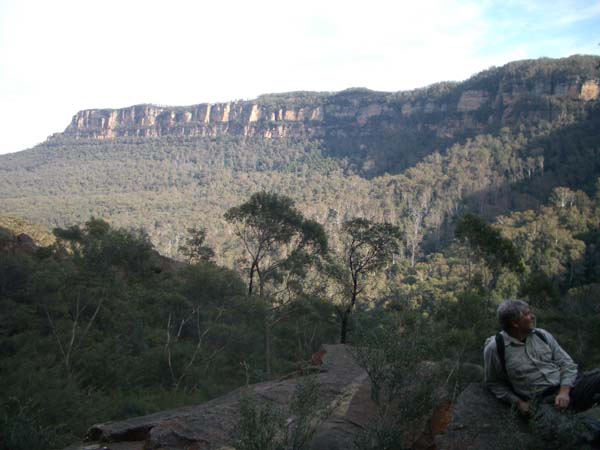 Doug resting on one of the bus-sized boulders from the landslide, with the long winter shadows beginning to creep across the valley. Narrow Neck is in the background; the Ruined Castle is just out of sight on the left. A half hour later we were at the base of the funicular, which saved us the thigh-destroying climb up the Ferber Steps to town. Christine and Caroline picked us up and dropped us at the Carrington Bar up in town. Beer! Potato chips! Rest! 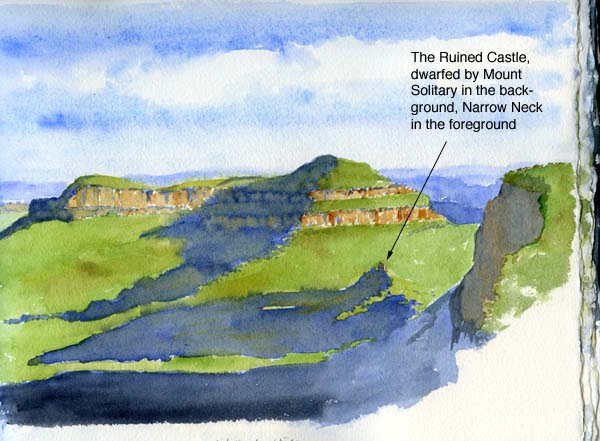 From my sketchbook, a trip out onto Narrow Neck on a late afternoon in April, 2007 -but it's not all fun
and games here! To
update earlier notes, the Liberal opposition has been disunited, in
fact all over the map, on whether it supports the government's
climate-change strategy, finally deciding at the end of the week after
numerous "backflips" by its leader that it will support an Emissions
Trading Scheme as long as it isn't introduced until about 2012, instead
of 2010 as the government wants.
-Sydney is over-run by eager young Catholics, all here for the visit of B-16 on Thursday. Sensing a chance to draw blood, the train-driver's union planned a one-day strike for that day, forcing a panicked NSW government to cave mightily on their anti-inflationary wage stance. In return for their new wage packets, the union has promised productivity improvements, not too rough a deal as, it is said, the Sydney train system is the least efficient in the whole Asia-Pacific region. -everyone's waiting to see whether anyone gets arrested for "annoying" or "inconveniencing" the visiting young Catholics, say with rude T-shirts or proferrred condoms. Three federal courts judges have expressed their unhappiness with the new laws but, in a country without a Bill of Rights, the purpose-written laws have so far withstood legal challenges. -mortgage rates continue to go up to stratospheric levels of about 9.5%, taking down more "battler" families every week. Petrol (gasoline) is about $1.75 a litre. |
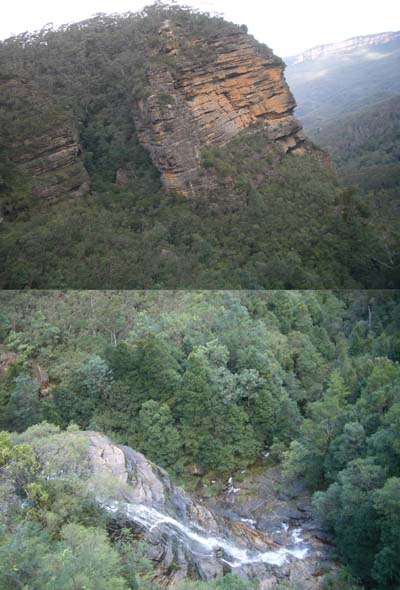 July 7,
2008: We walked yesterday on the steep trails
below the town of Leura, a few kilometres from home, where the
"cascades" go over a 200 metre cliff into the valley below. I took the
bottom half of the photo-composite with the camera pointing straight down,
about as vertiginous a view as possible. Although it's been very dry
for the past three weeks since we returned from Canada, the streams are
still running well. The bushland was pristine, the air clear and
bright... July 7,
2008: We walked yesterday on the steep trails
below the town of Leura, a few kilometres from home, where the
"cascades" go over a 200 metre cliff into the valley below. I took the
bottom half of the photo-composite with the camera pointing straight down,
about as vertiginous a view as possible. Although it's been very dry
for the past three weeks since we returned from Canada, the streams are
still running well. The bushland was pristine, the air clear and
bright...Concurrently, ironically, it was the week that environment degradation has been on everyone's mind, as the prime minister's principal advisor on climate change, the economist Prof. Ross Garnaut, delivered his 600-page report on an Emissions Trading Scheme to parliament. Proposed to begin in 2010, it will require all polluters (including individuals buying fuel for their cars but, perhaps, excluding the agriculture industry) in effect to pay a carbon tax. Predictably, industries such as power-generators are demanding free carbon permits, and some businessmen are suggesting that factories will simply move offshore if Australia gets too far ahead of the carbon-reduction targets of the big Asian economies. Equally predictably, the Liberal/Coalition is saying it can't support it because it doesn't help out the poor motorists; if there's any chance of Australia addressing climate change it will require a bipartisan approach, something very unlikely with the small-picture, short-term thinking of the leader of the opposition and his desperate colleagues. Fuel prices are the new version of blacktop politics. And this morning another dire warning from a scientific panel: the extremely hot and dry weather that normally occurs in Australia just once in 20 years will happen more frequently, like once in every two. Should be good for real-estate values in the cool mountains, we think cynically. -Much more entertaining are the preparations for the upcoming World Youth Day in Sydney and the visit of the pope, dubbed B-16 by the local media. People were bracing themselves for the road and bridge closures and general disruption of the week-long "pilgrimage," including the blocking-off of the Harbour Bridge, and planning to take holidays or work from home while grumbling about the tens of millions of taxpayer dollars going to support a religious event. The heavy-handed State Labor government then weighed in with a set of "rules," backed by heavy fines of $5,500 yet not debated in parliament, to dissuade anyone from "annoying" or "inconveniencing" the visiting Catholic youth (presumably none of whom have ever been part of the legal anti-gay / anti-Mardi Gras protests here). What could that mean? Well, anyone who has a sign or slogan insulting to them, or who, for example, wants to hand out condoms as a protest against the church's veto of their use to fight AIDs in Africa, could be arrested and fined. The government and the police of course say that the new laws will only be applied "with discretion." Naturally there has been a huge outcry from everyone remotely concerned with civil liberties and predictions that people will be out in their wildest T-shirts to test the rules. The comedy team from the ABC TV program The Chaser will probably put together a memorable stunt, although it will be hard for them to top the one they did for APEC last year: they rented a limousine, decked it with Canadian flags, put a guy dressed as Osama Bin Laden inside, and managed to drive through all the security cordons protecting the world leaders before stopping the car, getting out, and getting arrested. Lucky they didn't get shot; although the government pressed charges, they decided not to proceed with them. Why such a fuss about a religious event? The Catholic church has been very influential in Australian Labor politics for more than a half-century. There is so much religion mixed in with the politics here, especially in the publicly expressed beliefs of many politicians, that I sometimes think I've moved to the USA by mistake. -When we moved down here a year-and-a-half ago, I was amazed at how little homelessness there was in Sydney compared with Vancouver. Sydney appears to be catching up, according to the TV news. But the people "sleeping rough" are more often economic victims, it seems, than the kind of mentally-ill and drug-addicted people common on North American streets. 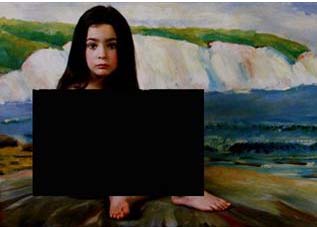 -And, finally,
boys will be boys and artists will be artists. A month
ago in a Sydney gallery the noted photographer Bill Henson exhibited
very arty but highly sexualized pictures of a 12-year-old naked girl,
leading to a police raid. Predictably, the art clique sprang to his
defence, claiming that artists' motives are never the same as perverts'
and that the police were trying to stifle free expression. No charges
were laid. Then a couple of days ago the prestigious "Art Monthly"
magazine featured a cover photograph of a naked 6-year-old girl, a
protest by the editor for artistic freedom
and a demand to return the use of children to their
traditional (presumably unclothed) role in art. (The photo above
is the news image that's appeared on TV -- the blank square concealing
her body was not part of the magazine cover.) This coming
during a period when the sexualization of
children in advertising and popular culture has become epidemic, say
some. -And, finally,
boys will be boys and artists will be artists. A month
ago in a Sydney gallery the noted photographer Bill Henson exhibited
very arty but highly sexualized pictures of a 12-year-old naked girl,
leading to a police raid. Predictably, the art clique sprang to his
defence, claiming that artists' motives are never the same as perverts'
and that the police were trying to stifle free expression. No charges
were laid. Then a couple of days ago the prestigious "Art Monthly"
magazine featured a cover photograph of a naked 6-year-old girl, a
protest by the editor for artistic freedom
and a demand to return the use of children to their
traditional (presumably unclothed) role in art. (The photo above
is the news image that's appeared on TV -- the blank square concealing
her body was not part of the magazine cover.) This coming
during a period when the sexualization of
children in advertising and popular culture has become epidemic, say
some.Regardless of whether the police and child-abuse campaigners are over the top in trying to repress these images, I just love the arrogance of Big Art: "We're artists and our motives are purely aesthetic; rules to protect children from exploitation don't apply to us, and we only need to say that what we do is 'art' in order to be above reproach ..." Lost in the art clique's response, but front and centre in that of the critics, is the fact that these kiddie images are photographs of a real individual who is legally unable to consent to the use of her image. If they were paintings or drawings concocted somehow from the artist's fevered imagination would there be any controversy? Maybe. Make them all paint landscapes, I say!! Photographs of young dogs and cats are okay, too! |
| July 1,
2008: the end of June is the end of the
financial/tax year in Oz, greeted with the news that this was the worst
year for the stock market since 1982. The local "all ords," as the
index is called (the "all ordinaries" -- well, who would buy ordinary
stocks? -- so named I guess because they're not preferred shares),
dropped 15 percent. It's amazing the way the robust, almost gluttonous prosperity of a year ago has evaporated. Petrol prices at the pump are on the order of $1.65 a litre, electricity rates are slated to rise and real-estate prices have dropped as much as 15% in some of the "battler" suburbs in the mortgage belts around the cities. Mortgage rates are averaging about 9%, pushing people closer to the edge. All the self-confidence has gone out of the retail market, and it is said that house prices are dropping even in the trendier suburbs. Only waterfront places in Sydney selling for $15 million or so are still doing well, apparently due to cashed-up buyers arriving from China and looking for second homes. The prime minister has gone from being teflon-coated to velcro-coated yet is gamely stating that there will be more difficult times ahead due to the need to introduce an Energy Trading Scheme to cap greenhouse gas emissions and control climate change. His party, Labor, have the majority in the parliament to push through their legislative agenda but are quite likely to be stymied by the Senate, where an independent, "no-pokies" loose cannon named Nick Xenophon suddenly holds the balance of power (the Senate composition was set in the election last November, but the changeover has only happened in the last week). Xenophon has stated he won't support the big "alcopops" tax increase that the government launched two months ago in an attempt to dry up young binge-drinkers, but has otherwise not said how he'll vote on the government's big issues. But he takes his role seriously, he assures everyone. People tend to vote with their heads, as it were, for the parliament, which is divided between Labor (the government) and the Liberal-led coalition; there are only a few independents in the lower house; for the Senate, however, people vote with their hearts or conscience, leading to a wider range of parties. The Greens, for example, held the balance of power in the Senate until the last election; now they will likely vote with the Labor senators. Oh, yes -- "no pokies." Pokies are the ubiquitious poker machines in every bowls, leagues and RSL (Legion) club in the land. Gambling's almost as big a problem as drinking. 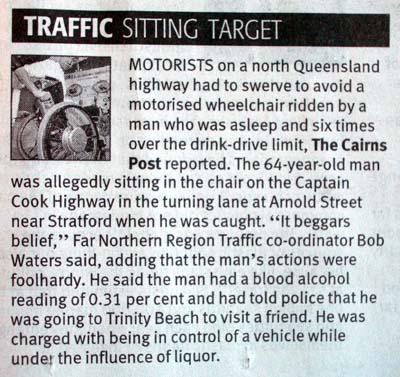 -and
finally, a news item from the "Deep North." Generally the news from
there involves crocodiles walking into bars (but they don't ask for
drinks). This is the sort of the story the French describe as un histoire insolite.
Quirky news.... -and
finally, a news item from the "Deep North." Generally the news from
there involves crocodiles walking into bars (but they don't ask for
drinks). This is the sort of the story the French describe as un histoire insolite.
Quirky news.... |
Return to home page
Read June 2008 blog Read May 2008 blog Read April 2008 blog Read March 2008 blog Read February 2008 blog
Read January 2008 blog Read December 2007 blog Read November 2007 blog
Read October 2007 blog Read September 2007 blog
Read August 2007 blog Read June 2007 blog
Read May 2007 blog Read April 2007 blog Read March 2007 blog
Read February 2007 blog Read January 2007 blog Read December 2006 blog
Go to my 2001-2 Australia travel book